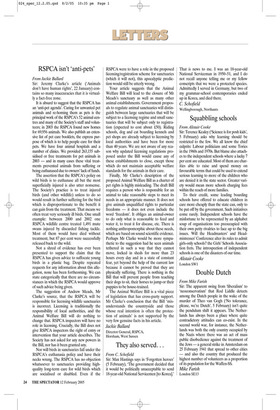RSPCA isn’t ‘anti-pets’
From Jackie Ballard Sir: Jeremy Clarke’s article (‘Animals don’t have human rights’, 22 January) contains so many inaccuracies that it is virtually a fact-free zone.
It is absurd to suggest that the RSPCA has an ‘anti-pet agenda’. Caring for unwanted pet animals and re-homing them as pets is the principal work of the RSPCA’s 52 animal centres and many of the Society’s staff and volunteers; in 2003 the RSPCA found new homes for 69,956 animals. We also publish an extensive list of pet care booklets, the express purpose of which is to help people care for their pets. We have four animal hospitals and a number of clinics. We provided 263,155 subsidised or free treatments for pet animals in 2003 — and in many cases these vital treatments prevented animals from suffering or being euthanased due to owners’ lack of funds.
The assertion that the RSPCA’s policy on wild birds is to euthanase all but the most superficially injured is also utter nonsense. The Society’s practice is to treat injured birds (and other wildlife) unless to do so would result in further suffering for the bird which is disproportionate to the benefit it can gain from the treatment. That means we often treat very seriously ill birds. One small example: between 2000 and 2002 one RSPCA wildlife centre treated 1,491 mute swans injured by discarded fishing tackle. Most of them would have died without treatment, but 87 per cent were successfully released back to the wild.
Not a shred of evidence has ever been presented to support the claim that the RSPCA has given advice to suffocate young birds in a plastic bag. Despite repeated requests for any information about this allegation, none has been forthcoming. We can state categorically that there are no circumstances in which the RSPCA would approve of such advice being given.
The suggestion of Andrew Meads, Mr Clarke’s source, that the RSPCA will be responsible for licensing wildlife sanctuaries is incorrect. Licensing is traditionally the responsibility of local authorities, and the Animal Welfare Bill will do nothing to change that. RSPCA inspectors will have no role in licensing. Crucially, the Bill does not give RSPCA inspectors the right of entry or intervention that your article describes. The Society has not asked for any new powers in the Bill, nor has it been granted any.
Nor will birds in sanctuaries fall under the RSPCA’s euthanasia policy and have their necks wrung. The RSPCA has no objection whatsoever to sanctuaries providing highquality long-term care for wild birds which are socialised or disabled. Even if the RSPCA were to have a role in the proposed licensing/registration scheme for sanctuaries (which it will not), this apocalyptic prediction would still be utterly wrong.
Your article suggests that the Animal Welfare Bill will lead to the closure of Mr Meads’s sanctuary as well as many other animal establishments. Government proposals to regulate animal sanctuaries will distinguish between large sanctuaries that will be subject to a licensing regime and small sanctuaries that will be subject only to registration (expected to cost about £50). Riding schools, dog and cat boarding kennels and pet shops are already subject to licensing by local authorities and have been for more than 40 years. We are not aware of any reason why updated licensing regulations proposed under the Bill would cause any of these establishments to close, except those which do not maintain acceptable welfare standards for the animals in their care.
Finally, Mr Clarke’s description of the proposed Animal Welfare Bill as a charter of pet rights is highly misleading. The draft Bill requires a person who is responsible for an animal to take reasonable steps to meet its needs in an appropriate manner. It does not give animals unqualified rights to particular freedoms — it does not even include the word ‘freedom’. It obliges an animal-owner to do only what is reasonable to feed and water it, to treat it for disease, etc. There is nothing anthropomorphic about these needs, which are based on sound scientific evidence. Perhaps Mr Clarke would be more sympathetic to the suggestion had he seen animals tethered in such a way that they cannot move, locked in sheds for more than 23 hours every day and in a state of constant fear, yet beyond the help of the current law because it cannot be proved that they are physically suffering. There is nothing in the Bill that will prevent people from teaching their dogs to sit, their horses to jump or their puppies to be house-trained.
The Animal Welfare Bill is a vital piece of legislation that has cross-party support. Mr Clarke’s conclusion that the Bill ‘misunderstands the countryside and those whose real intention is often the protection of animals’ is not supported by the very few genuine facts in his article.
Jackie Ballard
Director General, RSPCA, Horsham, West Sussex













































 Previous page
Previous page